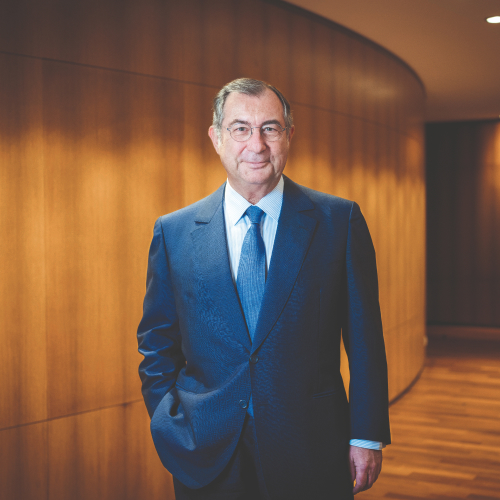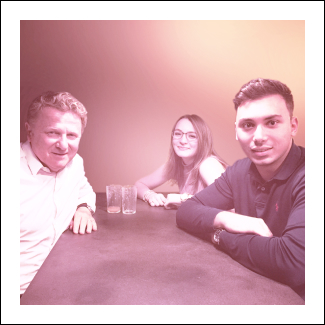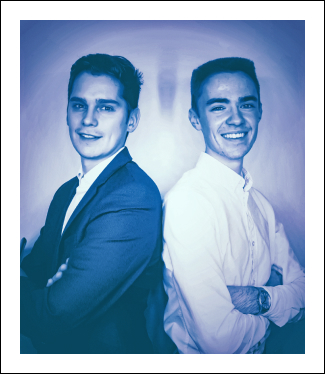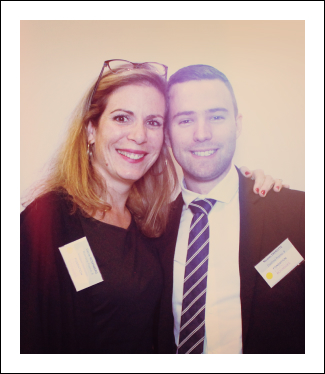
Making a difference
Social responsibility
Over 800 employees have already answered the Francis Bouygues Foundation’s call to provide support to deserving students from very low-income families. Many young people have thus been able to turn their academic dreams into reality thanks to their mentors’ dedication and willingness to share. Read on to find out more about these very socially mobile young people.
By Isabelle Godar
“Francis Bouygues believed strongly that men and women, no matter where they come from, should enjoy the same opportunities and advance on the basis of their skills and determination. He had that gift of being able to identify talent in people.”
Chairman of Bouygues Group

Created in 2005 by Martin Bouygues, the Foundation that bears the name of the Group’s founder offers financial and moral support to young students in financial difficulty. Promising young people who dream of becoming teachers, engineers, stylists or even researchers. Every year around 100 students are selected to receive high-achiever grants ranging from €1,500 to €5,000 a year, which is often in addition to the aid granted by the government. As well as this financial support, they receive individual assistance for their entire higher education (up to five years) from a mentor, who is either a Group employee or a former beneficiary of the Foundation.
Le rôle du parrain est de suivre la scolarité de son filleul, de l’encourager et le conseiller dans son orientation. De lui donner les codes de l’entreprise pour préparer son entrée dans la vie active avec de The mentor’s role is to support grant-holders throughout their studies, offer encouragement and advice on possible career paths, and to provide an understanding of company culture so as to build a solid foundation for the student’s first steps into the world of work. Mentors and grant holders are paired up based on shared interests, similar educational paths or geographic proximity They meet several times a year and are in regular contact by email, video call or telephone. Each relationship is unique and built over time. Mentors are motivated by a desire to be socially useful, and see the experience as a source of personal enrichment. The fact that many employees sign up again to be mentors, once a cycle has come to an end, is proof of this.
The foundation in figures
800
student applications are received
150
are selected to go before the Foundation’s jury
100
grant-holders are admitted
Since 2005
889
mentors (861 employees and 28 formers grant-holders)
889
students have received support and mentoring
418
graduates have begun their working lives
Mentors – in their own words
“I like their outlook on life and their optimism”
“I am a mentor to three of the Foundation’s grant-holders. They are based in my region and are studying engineering, philosophy and political science. Sometimes we all meet together. I appreciate their outlook on life and their optimism. It frees me from my own preconceived ideas and opens my mind up to other ways of thinking. Building the relationship with each grant-holder takes time. At the beginning they remained very formal, but gradually opened up to share more personal details. These become long-term relationships and I still remain in contact with my former grant-holders. As adults, it’s our duty to support the younger generation and help them fulfil their potential. Depending on our family and social backgrounds, not everyone has the same chances of professional success; some mentors have experienced the same difficulties themselves in the past. I consider myself lucky to be able to help these young people through the Foundation, and I encourage all my colleagues, regardless of their job or length of service within the Group, to try this experience.”
Regional Director, Bouygues Telecom Entreprises in Lille

“My grant-holder helps me understand young people”
“Jules and I live in the same neighbourhood of Lyon. We regularly meet up for a drink. His family lives in the north of France so it’s reassuring for him to have someone to talk to nearby. He’s currently preparing to enter engineering school. I have the same profile as Jules but his potential is such that I don’t really need to help him. He doesn’t seem to have any difficulty in learning. My role is more to prepare him for the realities of the world of work. I also advise him not to isolate himself, to get away from his books and make the most of his youth. Spending time with him gives me a better understanding of the young generation and its rules. I mentor both Millennials and Generation Z’ers and I can already see that their outlook on life and the meaning they attach to work are different to ours.”
Director of Operations, Bouygues Immobilier, Lyon

“There is a feeling of mutual enrichment and support that goes both ways”
“As a mentor, I was sometimes inclined to project my own dreams onto my three grant-holders: Nicolas, Gaëlle and Mariam. For example, given Mariam’s good results in physics and chemistry, I initially encouraged her to take preparatory classes, until I realised that what she really wanted was to follow a course at university. That taught me to listen more and to show more humility with these young people, each of whom has their own very different personalities. There is a feeling of mutual enrichment and support that goes both ways. Our grant-holders want us to talk about ourselves, our own doubts and vulnerabilities. That helps them to come out of their shells; the common denominator among these young people is their lack of confidence and their doubt in their ability to succeed. They need to be reassured. Being a mentor for the Foundation gives meaning to my working life. My manager has always encouraged me in this direction because he knows that it makes me happier in my work.”
in-house labour lawyer, Bouygues Construction, Saint-Quentin-en-Yvelines

Three questions to
Jean-François Guillemin
Président de la Fondation Francis Bouygues et ancien seChairman of the Francis Bouygues Foundation and former General Counsel of the Bouygues group
In what sense is the work of the Foundation a part of the Group’s genetic make-up?

Jean-François Guillemin
En 1952, Francis Bouygues a créé son entreprise avec de fIn 1952, Francis Bouygues created his company with very few resources. In his speeches, he said that “a company is nothing without its people” and he underlined the fundamental importance of mutual support. The Group has not forgotten this. This value underpins the aim of the Foundation, which is to help the best students from deprived families to cross the decisive milestone of higher education.
How does the Foundation respond to the expectations of society as a whole?

J-F G
For Martin Bouygues, who created the Foundation in 2005, it is simply a question of giving back to society what has been received. Stagnant social mobility is one of the biggest problems in French society. The Foundation meets a fundamental need by providing these students with a springboard to be able to complete their studies successfully. The vast majority of them have seized this opportunity. Every year, we stand in admiration at the courage and success of our grant holders!
What challenges do we face now and in the future?

J-F G
Le défi est la poursuite de notre action dans un The challenge is to maintain our commitment in a very difficult economic and social environment. And to achieve this, we will draw on the combined strength of the Bouygues group, the five core business segments and our mentors. I extend my thanks to all of them now!